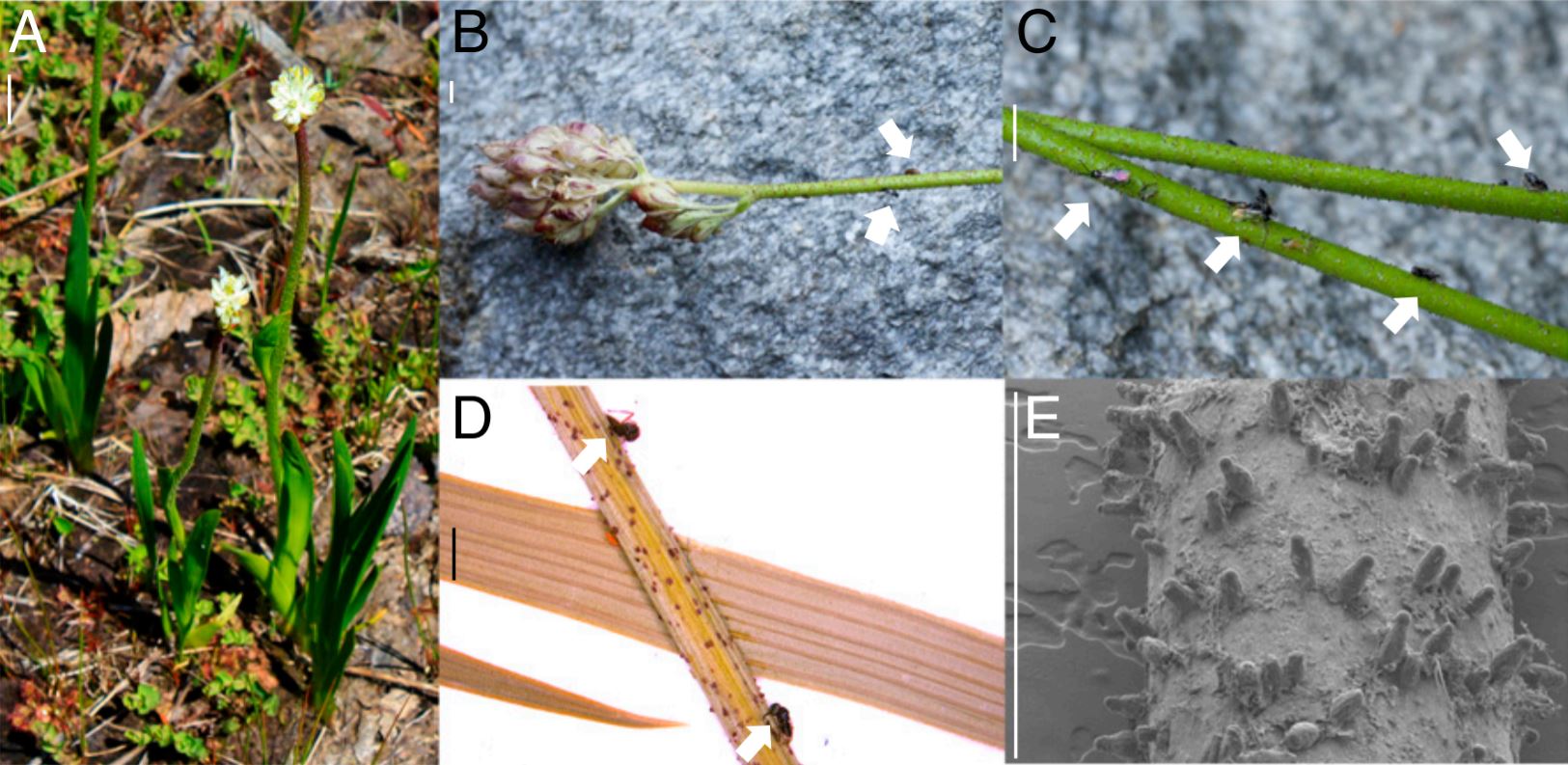
Posted on 08/09/2021 12:13:06 PM PDT by Red Badger
In the wetlands of the west coast of North America - from Alaska to California - there lives a herb-like plant that has just been discovered to have the occasional taste for flesh.
While the plant – called Triantha occidentalis – employs insects to pollinate its very normal-looking flowers, it also has sticky hairs just below these flowers for trapping small insects to munch on. This sounds a bit like a conflict of interest.
When it comes to imagining carnivorous plants that eat insects, spiders, or even small animals, the Venus flytrap (Dionaea muscipula) tends to be our stereotypical mental image. However, they are far from the only ones; in fact, there are over 500 different carnivorous plants, and we just keep finding more.
Excitingly, T. occidentalis is the 12th known evolution of carnivory in plants and the first time we've seen any carnivory in the Alismatales order of plants. And there's a reason more plants haven't worked out how to digest creatures.
"Only in habitats in which nutrients and nutrients alone are limited would you expect carnivory to be an advantage," says University of Wisconsin–Madison botanist Tom Givnish. When the soil is low in nutrients, particularly nitrogen and phosphorus, a little insect snack can be a welcome boost.
The team fed the plants nitrogen-15 labelled fruit flies, and were able to track the nitrogen entering the plant as T. occidentalis digested its meal. While overall this species had less nitrogen than surrounding plants, it had a substantially higher value of N-15 than its non-carnivorous neighbors. The team calculated that around 64 percent of its nitrogen was gained from insects.
plant with small bugs on the hairs T. occidentalis hairs, several with trapped insects (arrows). (Lin et al., PNAS, 2021)
But T. occidentalis isn't a stock-standard carnivorous plant. Most carnivorous plants do have flowers, but normally they're placed far apart from any eating apparatus the plant may also have.
The Venus flytrap, for example, will grow a very long stalk with a flower right on the top, to keep any pollinators far away from its snapping traps.
"What's particularly unique about this carnivorous plant is that it traps insects near its insect-pollinated flowers," says lead author, botanist Qianshi Lin, who was at the University of British Columbia at the time of the study.
"On the surface, this seems like a conflict between carnivory and pollination because you don't want to kill the insects that are helping you reproduce."
Having bees, butterflies, or other pollinators getting stuck when you want them to fly away to the next plant and spread your pollen does seem like a risky strategy.
However, it seems that the plant has a rather ingenious solution.
"We believe that T. occidentalis is able to do this because its glandular hairs are not very sticky, and can only entrap midges and other small insects, so that the much larger and stronger bees and butterflies that act as its pollinators are not captured," says Givnish.
That we've missed carnivory in this little plant - which grows relatively close to cities - is exciting to the researchers, who think there might be more secret carnivores out there just waiting to be found.
"Given the existence of Triantha in close proximity to major urban centers on the Pacific coast, our study serves as a vivid reminder that other cryptic carnivores may yet remain to be discovered," the team writes in their study.
The research has been published in the Proceedings of the National Academy of Sciences.
“Feed me.”
“...Seymour”
Thought he was the night DJ at WKRP.
I’m planting it everywhere, and I’ll water the heck out of it.
Where are the bug’s parents? And what the hell are they teaching these bugs at school? PATHETIC. Until they reform their educational system and tell the stamen to stay with the kids, these bugs will continue to be consumed by these plants.
And it E V O L V E D over
M I L L I O N S of years. All by itself!
Started from N O T H I N G.
A regular average happens millions of times all over the world M I R A C L E.
To paraphrase the hero dad protagonist in The Incredibles, “When everything is a miracle, nothing is a miracle.”
And it E V O L V E D over
M I L L I O N S of years. All by itself!
Started from N O T H I N G.
A regular average event that happened millions of times all over the world M I R A C L E.
To paraphrase the hero dad protagonist in The Incredibles, “When everything is a miracle, nothing is a miracle.”
Interesting.
The sticky substance would have to have enzymes to digest the insects.
So, what damage would be done to the pollinators that come in contact with it and escape.
Or the enzymes may not be present in the sticky substance until after an insect is captured and the struggling insect stimulates the release of the enzymes.
It would be interesting to find out.

in before the first triffid joke
Or simple uptake by diffusion of decomposing insects.
Lots of carnivorous Sundews (Drosera) in Alaska, near muskeg bogs with acidic soil. They reduce the mosquito population by a small amount, but not enough to notice.
I don’t think that is likely.
It would be a waste of the plant’s resources.
The decomposers would make off with some of the phosphorus and nitrogen that is for which the plant produces the sticky substance and the decomposers would take longer.
“Day Of The Tiffids!
I live in Georgia. I stay away from Kudzu because I have suspicions about that plant.
Biden or Harris?
Disclaimer: Opinions posted on Free Republic are those of the individual posters and do not necessarily represent the opinion of Free Republic or its management. All materials posted herein are protected by copyright law and the exemption for fair use of copyrighted works.